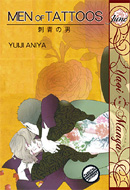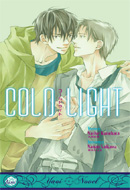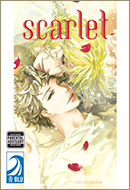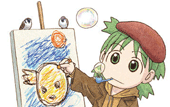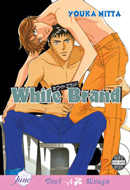   |
Manga-ka: Youka Nitta
Publisher: DMP/June
Rating: Mature (18+)
Released: December 2008
Synopsis: “Keshiki and Izuru were best friends as little kids. But when a heartbreaking family tragedy changes Keshiki’s world forever, he pushes away all of the wonderful things that used to fill his carefree days with joy… including the confused and hurt Izuru. Many years later, the two boys find that they’re students at the same school. Has time healed Keshiki’s wounds, or does he need a helping hand to lead him out of the darkness and into the light of friendship?”
Best known for her multiple volume series, Haru wo Daiteita (and recent art scandal), Youka Nitta puts together a collection of short stories here in White Brand. Ranging from a fear of dirty things to a couple of mind readers uprooting an artistic scam, there’s plenty here for readers to sink their teeth into, both with interest and scrutiny.
The first story introduces readers to Asano, a troubled young man that suffers trauma after an accident that killed his Father. Through a stretch of an explanation, even as far as a child’s logic can be used as an excuse, Asano has a fear of dark things because he views them as unclean. Enter his childhood friend, Izuru, who is dedicated to growing close with Asano again after a decade of avoidance, but his tanned skin is going to prove a problem when trying to reconnect. Obviously I’m assuming this isn’t any intentional racial statement (Izuru is tanned, not of a darker-skinned ethnicticity), but seeing someone pull away from a tanned hand screaming ‘it’s dirty!’ is hard to ignore in the current context.
The book’s second story deals with a young man who moves to Japan to achieve his dream of becoming a great lacquer artist. Much to his dismay, his talent falls on blind eyes when his race becomes the focus of people’s scrutiny over his accomplishments. While the set-up of this dilemma didn’t hit me as irksome as the first, its ending did leave me feeling a little cold. What the English character must deal with in his yearning for acceptance of a Japanese-styled art is a believable and sympathetic issue yet it was fixed with such a catch-all band-aid solution that it seemed to scoff at its own potential.
Another of the stories in this collection stars a group of all-male performers. One of the cast in particular struggles with his current casting as a woman who must deal with her inability to have children. Trying to find a way to understand, he borrows his sister’s enfant son in the hopes of discovering the core of his character’s emotions. Well, let me tell you that I have no sympathy for him which made it hard for me to find anything about this particular story entertaining past my sheer disgust. Shove a crying baby’s face into a bed then try to find sympathy for your acting, attention-wanting woes? I think not! I saw a baby and had hopes for a sweet story of a group of guys tending to him but instead just felt horrible for the poor kid being abused by his obviously troubled uncle.
Now its not all bad mind you. I did find the stories a little shallow, something unfortunately caused in partial by the fact they’re short stories, but that didn’t stop several from being at the very least entertaining. I wouldn’t call any of these stories very romantic, though there were a few sweet moments; my favourite being between the lacquer’s son and the object of his affection. There also isn’t anything in the way of smut despite the Mature rating but readers, Youka Nitta fans especially, should be pleased with the eye-candy regardless.
White Brand is a classic Digital Manga release with an attractive dust jacket, sharp printing and a translation that I didn’t find any reason to have qualm with. One thing that did pop out to me though is one chunk from the book’s back cover synopsis: “Keshiki and Izuru were best friends as little kids. After all, they’re exactly the same age!” Wowie! The same age! … So? It doesn’t come up in the story so I was a little confused, and admittedly had a laugh, over why it was so needlessly emphasized on the back.
Come the end, I was in amused awe at this little collection. While some stories and their own individual quirks passed me by with a contented ‘that was neat’, some just struck me as so silly in their ignorantly naive portrayal of racism and abuse. Youka Nitta’s solid art style and consistent pacing makes the quality of this story worth a read, but the unorthodox nature of some of the stories may leave more than one reader scratching their heads.
Review written December 27, 2008 by Lissa Pattillo.
Book provided by DMP/June for review purposes


 Follow
Follow